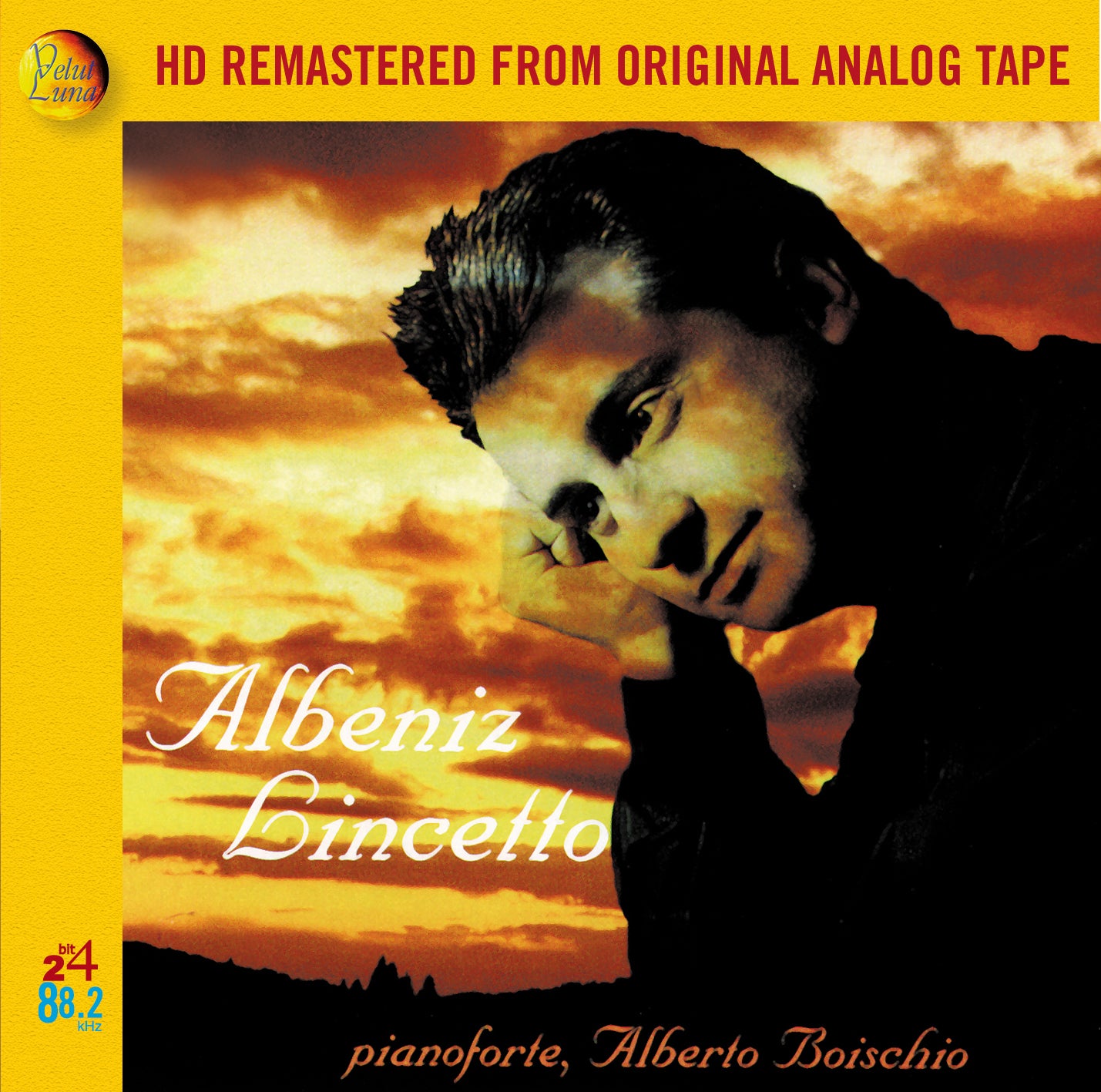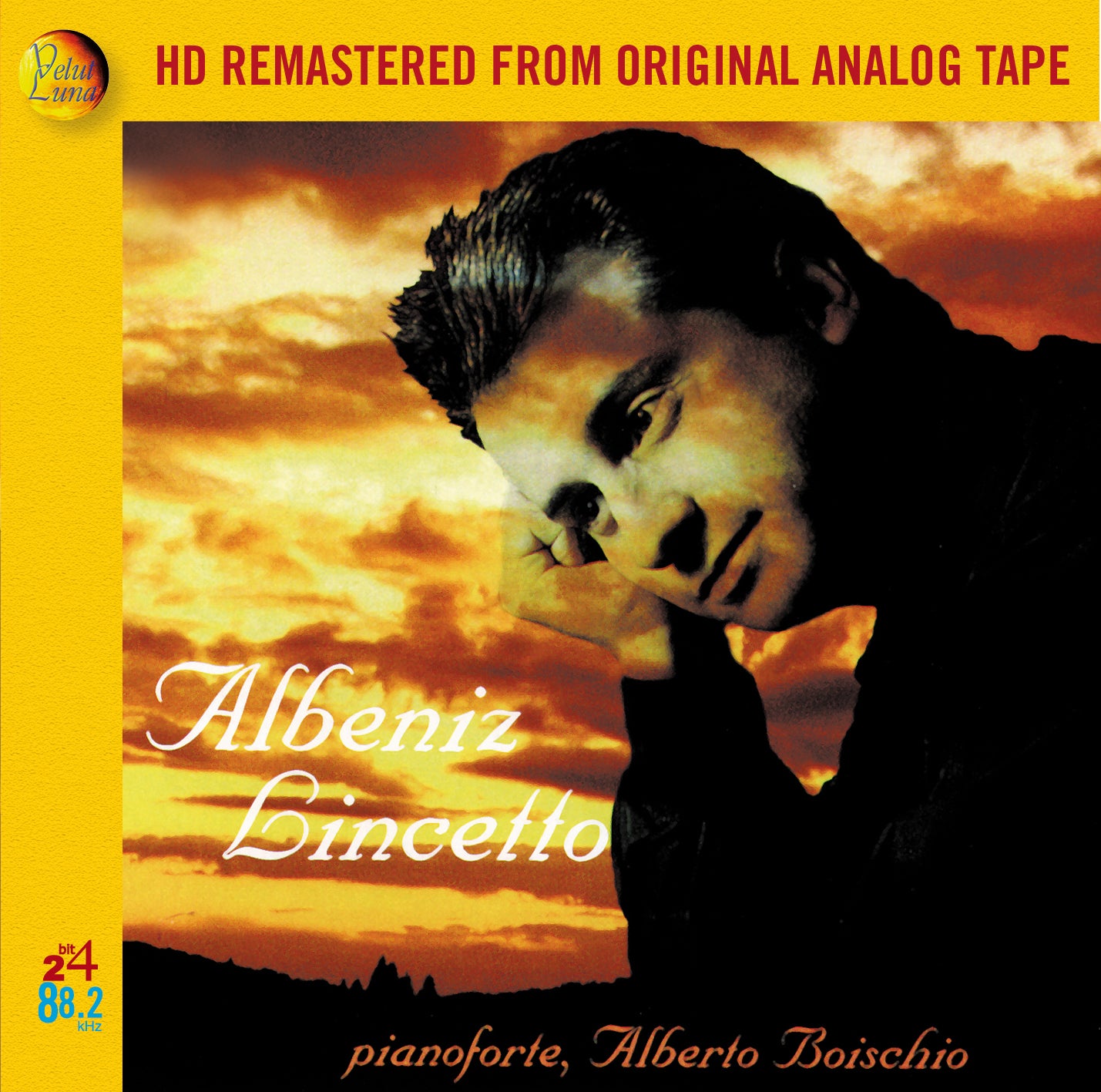Velut Luna
ALBENIZ, LINCETTO: PIANO SOLO
ALBENIZ, LINCETTO: PIANO SOLO
Genere musicale:
Disponibile
Impossibile caricare la disponibilità di ritiro
ALBENIZ, LINCETTO: PIANO SOLO (CVLD256)
HD REMASTERED FROM ORIGINAL ANALOG TAPE
ISAAC ALBENIZ
Recuerdos de viaje
01 - En el mar, 5:52
02 - Leyenda, Barcarole, 4:34
03 - Alborada, 4:53
04 - En la Alhambra, 3:53
05 - Puerta de tierra, 3:38
06 - Rumores de la Caleta, 3:25
07 - En la playa, 5:17
ADRIANO LINCETTO
Schizzi per pianoforte (1989)
08 - Preludio, Lento espressivo, 2:17
09 - Notturno, Andante sereno, 2:28
10 - Lento espressivo, 3:49
11 - Allegramente scanzonato, 1:02
Tot. Time: 41:12
The recording was made using the 1/4” two tracks master Teac 2-B RTR, at 38 cm/sec. on August 1997 at Taio Public Auditorium, sheltered between the refined and snug silences of the Trento’s Alps. HD digital remastering by Marco Lincetto was made at Velut Luna Studio, in Casalserugo, on June 11, 2014, using Velut Luna Analog Console and stereo Ad converter Prism Sound Ad-2 Dream set at 24bit/88.2kHz
Production: Velut Luna
Executive Producer: Marco Lincetto
Musical producers: Marco Lincetto
Recording, mix and mastering engineer: Marco Lincetto
Photos: Marco Lincetto
Design and layout: L’Image
Sales manager: Patrizia Pagiaro
Isaac Albeniz
Eccellente pianista catalano, Isaac Albeniz ha avuto una vita piuttosto vivace. Dopo aver studiato pianoforte con Marmontel al Conservatorio di Parigi e con Mendizabal al Conservatorio di Madrid, fuggì da casa per intraprendere la carriera concertistica come era ancora molto giovane. Viaggiando in molti paesi come il Sud America, gli Stati Uniti, l'Inghilterra e la Germania, ha potuto sperimentare le esperienze più varie. Infine, nel 1878, poté coronare il suo sogno di diventare allievo di Liszt, e quindi lo seguì a Roma e a Budapest. Dal momento in cui incontrò il famoso virtuoso e compositore, Albeniz si interessò molto alla composizione; le prime composizioni chiaramente influenzate dalla poetica Lisztiana appartengono a questi anni. Nel decennio tra il 1880 e il 1892 si dedicò all'insegnamento, mantenendo allo stesso tempo l'attività concertistica e ampliando il suo repertorio di recital con le proprie composizioni. Nel 1892 si trovava a Londra, dove poteva beneficiare del sostegno finanziario del banchiere Francis-Money Couts. Si stabilì a Parigi dal 1893 e lì, in piena maturità, il suo talento di compositore finalmente riuscì ad esprimere (Iberia, la sua composizione probabilmente più conosciuta e importante, risale a questo periodo). L'amicizia e la vicinanza con i migliori personaggi del mondo musicale francese del tempo, evidentemente esercitato una forte influenza su Albeniz: Faurè, Debussy, Dukas, Chausson. Sfortunatamente, gran parte del suo lavoro è andato perduto. Eppure molte composizioni - principalmente composte per il suo strumento, il pianoforte - rimangono ancora inedite o non riconosciute. Curiosamente, nell'immaginario popolare il nome di Albeniz è spesso unito alla chitarra; ciò è dovuto alla sua origine spagnola, ma, soprattutto, ad una fortunata serie di sue trascrizioni di pezzi per lo strumento a sei corde, realizzati da celebri chitarristi. L'insieme delle composizioni proposte nel presente CD è, secondo l'opinione dello scrittore, particolarmente significativo ed esemplificante della poetica di Albeniz. I toni evocativi e fortemente descrittivi permettono di svelare in modo significativo le tante esperienze di vita dell'autore.
Adriano Lincetto
Il Maestro Adriano Lincetto - il titolo non viene sottolineato per caso, come vedremo in avanti - è nato a Padova il 7 ottobre 1936, e lì morì in circostanze tragiche il 24 aprile 1996. Durante questi sessant'anni, maturò una grande esperienza nella musica, che, fin dalla sua prima infanzia era in assoluto il suo principale compagno di vita. Nonostante la sua umile origine, la sua volontà di ferro (lavorava di giorno come messaggero per pagarsi le lezioni di pianoforte) e il suo vero talento naturale gli ha permesso di laurearsi brillantemente in soli sette anni con pieni voti e lode al Conservatorio di musica di Padova sotto la guida del Maestro Silvio Omizzolo. Il suo carattere riservato e intimamente modesto non gli permise di sviluppare la carriera concertistica che negli anni Sessanta il suo talento gli avrebbe potuto offrire: infatti, nonostante le tournée di successo come solista e in formazioni cameristiche - non solo in Italia ma soprattutto in Svizzera e in Francia (citiamo alcune acclamate registrazioni radiofoniche per ORTF, per la Radio Nazionale Francese e per la Radio Svizzera) - a metà degli anni Settanta si ritirò dalle scene per dedicarsi all'insegnamento e alla composizione. Le sue collaborazioni con alcuni celebri cantanti lirici aprono un altro - e in qualche modo irrisolto - capitolo importante: citiamo soprattutto Lucìa Valentini Terrani, che ha scoperto e spaziato verso il successo mondiale che tutti conoscono, e il baritono Antonìo Salvadori. Ancora una volta, nel 1972, la sua eccessiva modestia e forse il suo eccessivo attaccamento alle sue radici lo indussero a rinunciare al ruolo di sostituto regista e cantante formatore che gli era stato offerto dai nuovi manager del prestigioso Metropolitan Theatre di New York, che era allora in una fase di riorganizzazione amministrativa dopo un periodo di crisi: è curioso ricordare come sia successo che, dopo il suo rifiuto, sia stato scelto un giovane talento americano, James Levine, con i risultati che tutti conoscono. Per il grande amore che aveva per la musica, nel suo senso più intimo e familiare, ha diviso la sua vita in due attività principali: quella pubblica, l'insegnamento (è stato professore di pianoforte al "suo" Conservatorio di Padova dal 1966 fino alla sua morte) e l'altra, intimamente privata, la composizione. Lincetto scriveva soprattutto per se stesso, e più spesso per i suoi amici musicisti, certamente non per acclamazione popolare, soldi e ricchi premi. Questo modus operandi, specchio della sua vera e pura natura artistica, gli ha permesso di "... uscire dalla parodia del cosiddetto mondo artistico - a sua volta una parodia grottesca e letale di ciò che è generalmente inteso per il mondo - senza curarsi di alcuna suggestione, imposizione e criterio che provenivano da quella parodia dell'arte. Il suo salvataggio, e quello di chi ascolta la sua musica, è nell'equilibrio in cui ha vissuto e composto, oltre le cose vecchie e nuove..." , come famoso filosofo e musicologo rumeno Radu Lidjienko ha scritto su di lui qualche tempo fa. Adriano Lincetto ha davvero scritto molta musica per orchestra, solisti, coro, le più diverse assemblee musicali e per vari strumenti come il mandolino e il "corno delle Alpi"; al contrario, ha appena scritto per pianoforte solo. Oltre alla composizione di questa registrazione, citiamo anche "I Momenti Musicali" e qualche altra composizione minore potentemente condizionata dalla poetica chopínìan, composta in gioventù e interamente dedicata alla moglie, all'epoca sua fidanzata.
Alberto Boischío
Alberto Boischio è un pianista anziano ma giovane. Ha dedicato tutta la sua vita fino ad oggi al pianoforte, senza dimenticare la sua famiglia, sua moglie e, da un anno, il suo piccolo figlio Matteo. Eppure il pianoforte rappresenta tutta la sua vita e speriamo che continui ad essere così, per l'opinione incondizionata che abbiamo nel suo talento: al di là di ogni inutile elenco cronista di premi, titoli e quant'altro oggi l'"intellighenzia", l'aristocrazia della musica-mondo sembra chiedere di dare la licenza di grandi artisti.
Share

-

Spedizioni prodotti fisici
Spedizioni gratuite in Europa (UE), a partire da 4 articoli - Richiedere quatozione per i costi di spedizione per i paesi non UE
-

Consegna prodotti digitali
La consegna dei prodotti digitali avverrà direttamente sul sito e riceverai anche una email con il link per il download dei file.
-

Scrivi una recensione
Qui sopra puoi scrivere una recensione sul prodotto che hai acquistato, saremo felici di conoscere la tua opinione.


